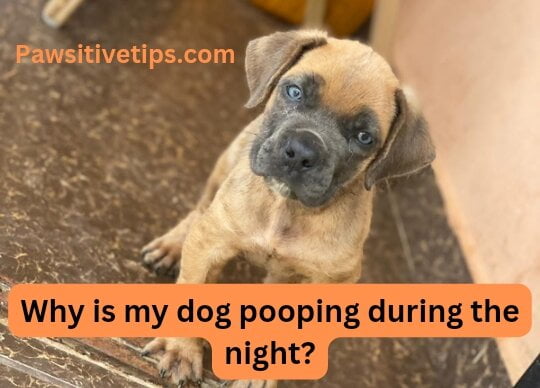Why is my dog pooping during the night?
Why is my dog pooping during the night? I got this question today from a fan, and I have decided to answer it and some other related questions here for a better understanding. If your dog has the habit of pooping during the night and you genuinely want to know the reasons for this behavior, you might want to stick around and read this article from the beginning to the end for the answer. But before we move further, you might want to check out the best time to feed dogs so they don’t poop at night.
In this article, we’ll discuss the most common reasons why dogs poop during the night, as well as some tips on how to stop this behavior. We’ll also cover some related topics, such as how long after eating does a dog poop, how do you know when a dog needs to poop, etc.
Why is my dog pooping during the night?
As someone who has many dogs and lots of experience when it comes to dog behavior, I am going to be showing the very few reasons why your dog could poop during the night and why it’s essential to address the issue promptly to ensure the well-being of your dog. Below are some potential explanations for why your dog is pooping during the night:
- Not fully potty trained: One of the reasons why your dog is always pooping during the night is because it is not fully potty trained. If your dog is not properly potty trained, it may not be able to hold it in overnight. This is especially common in puppies, who have smaller bladders and bowels.
- When there’s a change in routine: If your dog’s daily routine changes, such as if you go on vacation, change location, or change feeding routine, it may start pooping during the night because it is not used to the new schedule and may not be able to hold it in during the night.
- Anxiety or fear: If your dog is anxious or fearful, it may poop during the night as a way to relieve its stress. This is more common in dogs who have been through traumatic experiences, such as being abused or neglected.
- Medical conditions: Some medical conditions can cause dogs to have loose stools or diarrhea, which makes it difficult for them to hold it in overnight. These conditions include:
* Inflammatory bowel disease (IBD)
* Diabetes
* Kidney stones
* Liver disease
* Parasites - Age-related Factors: When people ask why their dogs are always pooping during the night, the first thing I ask is how old the dog in question is. This is because older dogs might experience a decline in muscle control and bowel movements as they age. This can lead to accidents during the night, especially if they have difficulty waking up or holding it until the morning.
Related articles:
- Why do dogs poop on beds?
- Why Potty Training Dogs in the Rain is Important
- How to Potty Train a Labradoodle Puppy
- 3 Reasons Why Dogs Pee On Car Tires
How do I stop my dog from pooping during the night?
Here’s an extensive step-by-step guide to help you achieve success in training your dog to stop pooping during the night:
Rule out any medical causes
If your dog has recently started pooping at night or if the problem is getting worse, it’s important to rule out any medical causes, just like the ones I highlighted above. Also, when you suspect that this sudden pooping in the night is caused by a medical condition, be sure to take your dog to the vet for a proper checkup.
Establish a regular feeding schedule
I have extensively explained this point in this article; you might want to check it out. Meanwhile, establishing a regular feeding schedule is one of the best ways to prevent nighttime pooping. This will help to regulate your dog’s digestive system and make it less likely that they will need to go to the bathroom in the middle of the night.
A good feeding schedule for most dogs is to feed them twice a day, once in the morning and once in the evening. You should avoid feeding your dog late at night, as this can give them too much time to digest their food before they go to bed.
Take your dog out for a potty break before bed
This is one of the most important things you can do to prevent nighttime pooping. Make sure to take your dog out for a potty break at least 30 minutes before you go to bed. This will give them a chance to empty their bladder and bowels before they go to sleep.
If you have a puppy, you may need to take them out more often than this. Puppies have smaller bladders and bowels, so they need to go to the bathroom more frequently.
Create a relaxing bedtime routine
A relaxing bedtime routine can help reduce your dog’s anxiety and make it less likely that they will have a nighttime accident. This routine could include things like giving your dog a bath, brushing their teeth, and playing a calming game.
It’s also important to make sure that your dog’s crate or bed is in a quiet and comfortable location. You should avoid putting their bed in a high-traffic area, as this could make them feel anxious.
Be patient and consistent
It may take some time to stop your dog from pooping during the night. So, you need to be patient and consistent with your training, and eventually you will see results.
If you are consistent with the above tips, you should be able to stop your dog from pooping during the night. However, if the problem persists, it’s important to consult with a veterinarian or a certified dog trainer. They can help you rule out any medical causes and develop a customized training plan for your dog.
Is it better to feed dogs early or late?
I have actually answered this question earlier, but I will reiterate it again: it is not healthy to feed your dog very late at night because of the following potential risks:
- Weight gain: If your dog is eating late at night and not getting enough exercise, they may be more likely to gain weight.
- Gastrointestinal problems: Eating late at night can put extra strain on the dog’s digestive system, which can lead to problems such as vomiting, diarrhea, and constipation.
- Sleep disturbances: Eating late at night can disrupt the dog’s sleep schedule, which can lead to behavioral problems such as barking and restlessness.
How many times a day should a dog poop?
The number of times a day a dog poops depends on a number of factors, including the dog’s age, breed, activity level, and diet.
- Puppies: Puppies poop more often than adult dogs. They may poop as many as 5 times a day.
- Adult dogs: Adult dogs usually poop once or twice a day.
- Senior dogs: Senior dogs may poop less often than adult dogs. They may poop only once a day or even less often.
- Breed: Some breeds of dogs are more prone to constipation or diarrhea than others. For example, bulldogs and pugs are more prone to constipation, while German Shepherds are more prone to diarrhea.
- Activity level: Active dogs may poop more often than less active dogs. This is because they burn more calories and need to replenish their energy levels more frequently.
- Diet: The type of food a dog eats can also affect how often they poop. Dogs who eat a high-fiber diet may poop more often than dogs who eat a low-fiber diet.
How do I know if I’m feeding my dog enough?
To determine if you are providing the right amount of food, consider the following factors:
- Body condition score: A body condition score (BCS) is a way of assessing your dog’s body fat. A healthy dog will have a BCS of 4 or 5 on a scale of 1 to 9. A dog with a BCS of 1 is emaciated, while a dog with a BCS of 9 is obese.
- Ribs: You should be able to feel your dog’s ribs easily, but you should not be able to see them. If you can see your dog’s ribs, they are not getting enough food. If you cannot feel your dog’s ribs, they are getting too much food.
- Waist: You should be able to see a slight waistline when you look at your dog from above. If your dog has a round belly, they are getting too much food.
- Energy level: A healthy dog should have plenty of energy. If your dog is lethargic or seems tired all the time, they may not be getting enough food.
- Coat: A healthy dog should have a shiny, healthy coat. If your dog’s coat is dull or dry, they may not be getting enough nutrients.
How do I know if my dog wants to poop?
There are a few signs that your dog may be wanting to poop. These include:
- Sniffing around: Dogs will often sniff around for a spot to poop. This is because they are trying to find a spot that is safe and private.
- Circling: Dogs will often circle before they poop. This is a way of marking their territory and making sure that the area is clear.
- Squatting: If your dog is squatting, they are probably ready to poop.
- Grumbling: Some dogs will grumble or whine when they need to poop. This is a way of telling you that they need to go outside.
- Going to the door: If your dog is going to the door, they may be trying to tell you that they need to go outside.
Is it Ok to feed your dog once a day?
There is no definitive answer to the question of whether or not it is okay to feed your dogs once a day. Some veterinarians recommend feeding dogs twice a day, while others still recommend feeding them once a day. Based on my experience, the best feeding schedule for your dogs will depend on their individual needs, and you’ve got to consider the following factors as well:
- Age: Puppies need to eat more frequently than adult dogs, so they may need to be fed twice a day. Adult dogs can usually go for longer periods between meals, so they may be able to be fed once a day.
- Activity level: Active dogs may need to be fed more often than less active dogs, as they burn more calories.
- Health: Some dogs have medical conditions that require them to eat at certain times of the day. For example, dogs with diabetes need to eat regular meals to keep their blood sugar levels stable.
- Your own schedule: It is important to choose a feeding schedule that works for you and your dog. If you have a busy schedule, you may need to feed your dog once a day so that you do not have to worry about them getting hungry during the day.
Can I feed my dog at 10am?
Yes, you can feed your dog at 10am. There is no rule that says dogs can only be fed at certain times of day. However, it is important to be consistent with your feeding schedule so that your dog knows when to expect food. If you are going to feed your dog at 10am, try to stick to that time as much as possible. This will help to keep your dog’s digestive system regular.
Is 4pm too early to feed a dog?
Generally speaking, it’s not too early to feed a dog at 4pm. However, it’s important to consider your dog’s individual needs and preferences. Some dogs may do better with feeding later in the evening, while others may prefer to eat earlier in the day.
Final Thoughts
We’ve come to the conclusion of the topic, “Why is my dog pooping during the night?” Remember, no dog is the same, and the reasons for nighttime pooping can vary. But with patience, consistency, and understanding, you can work through this issue and help your dog maintain healthy elimination habits.
By following the tips on how to stop your dog from pooping during the night, you can help change your dog’s pooping schedule and prevent accidents in the house. If you love the article, please share it.



